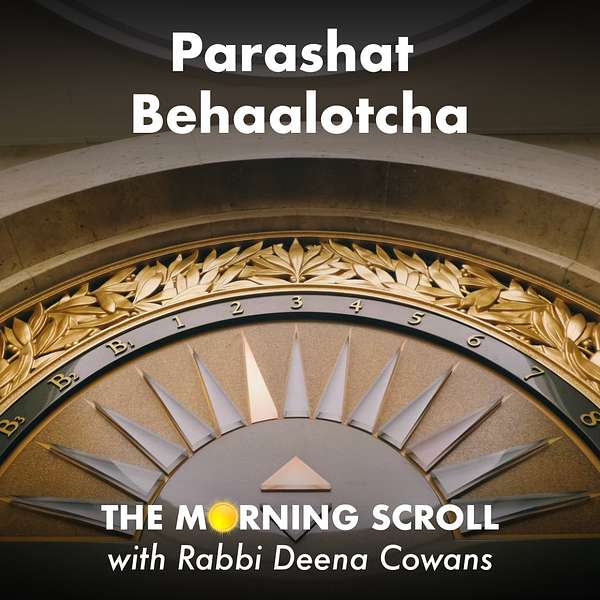
The Morning Scroll
The Morning Scroll
Parashat Behaalotcha, June 16th
Use Left/Right to seek, Home/End to jump to start or end. Hold shift to jump forward or backward.
Could you take a moment to fill out this brief survey to let us know what you think of the show? It would help us out so much!
Going up? No? Good, because tzaraat has been going around and theres no more room on this lift. This week's parsha is all about lifting each other up — let's get woo.
Produced by Mishkan Chicago. Music composed, produced, and performed by Kalman Strauss. See our upcoming Shabbat services and programs here, and follow us on Instagram and like us on Facebook for more updates. Check out Shabbat Replay on Contact Chai for more from Rabbi Deena.
Transcript
Welcome to The Morning Scroll! I'm Rabbi Deena Cowans from Mishkan Chicago and you're listening to what will be a quick dive into this week's parsha. If you’ve been meaning to brush up on your Jewish literacy, or you’re looking for some inspiration, you’ve come to the right place. This week, we read Parashat Beha’alotcha, “when you lift up”, which kind of sounds more woo woo spiritual than the parsha means it, maybe. We’ll start with a brief recap:
God tells Aaron to light the Menorah in the Mishkan on the daily, and then we dive into an initiation ritual for the Levites, which involves shaving, sacrifices and some trips to the mikvah. The first anniversary of the exodus arrives, but some people are unable to celebrate, so they complain and Moshe and God agree there should be a second Passover so people who can’t observe the first one get a chance a month later. Back to the Mishkan, we’re reminded that it is covered by a cloud during the day and fire at night, and when the cloud lifts, it was the cue to the Israelites to pack up camp and follow the cloud. Sometimes, they would only camp overnight, and sometimes, they stayed for a while. Moshe also has some special silver trumpets to blast out messages, like calling people’s attention to the cloud moving. One year after revelation at Sinai, the cloud is ready to move on, but no sooner do they start than the people are complaining, this time about wanting meat, not manna. Moshe’s fed up with the job, so God tells him to gather 70 elders to help him, and also if the people want meat, let’s give them so much it comes out their noses, or so says the Torah. God gives the 70 elders the gift of prophecy, and two others, named Eldad and Medad, start prophesying also. Miriam gossips about Moshe and is stricken with tzaraat. Moshe prays for her healing, but God wants her to deal with the consequences, so the Israelites wait 7 days for her to heal.
So remember at the beginning of the episode when I said that the behaalotcha name of the parsha sounded more spiritual than it was? Well, that was true but also… not totally true. In the beginning of the parsha, the word does just literally mean to raise a thing, namely, the menorah. But later, we see 70 elders raised up, spiritually, to access God’s will and be able to act as prophets and aides to Moshe. This is rather unusual: The Torah has several warnings against false prophecy and people who think they are speaking the word of God but aren’t, but this parsha also has a moment of “what if we could all be this attuned to God?” When Moshe calls in the elders to receive the Divine spirit for prophecy, Eldad and Medad stay behind in the camp but began prophesying anyway. Joshua is not a fan of this and goes to tattle to Moshe, but Moshe just says, “If only all of God’s people were prophets and God would put the Divine spirit on all of them!” The commentators understand this line as Moshe seeing his own holy spirit reflected or refracted onto others, and wishing they had their own true prophecy as well as him. He understands that the current arrangement of the elders is God’s way of helping him out but won’t last beyond his lifetime, and he wishes it wasn’t just a him thing.
This points us to two different lessons. One, we are a reflection of our leaders. They serve on our behalf, and we are lifted up (or not) but them. And, just because we are a reflection of our leaders doesn’t mean we should, or have to be. Even a leader like Moshe, who this parsha describes as exceedingly humble and blessed, wishes that these people wouldn’t need him to access divine inspiration, teaching us that we should aspire to holiness and spiritual connection regardless of who represents us. These two lessons call us to push our leaders to be better, and to not allow formal leadership to hold us back from making changes or speaking truth.
I want to bless Eldad and Medad for teaching us this lesson, and for having the courage, or passion, to remain in the camp sharing their spirit with their community. And I want to bless each of you for the ways you make your own spirit known in community, and hope that you will see and appreciate how you lift up your community with your spirit.
Before you move on, We need your help. In the show notes, you’ll find a link to a brief survey. We want to know what you think about the podcast! If you could take one minute today to fill it out, it would mean so much to us. Thank you! See you next week.